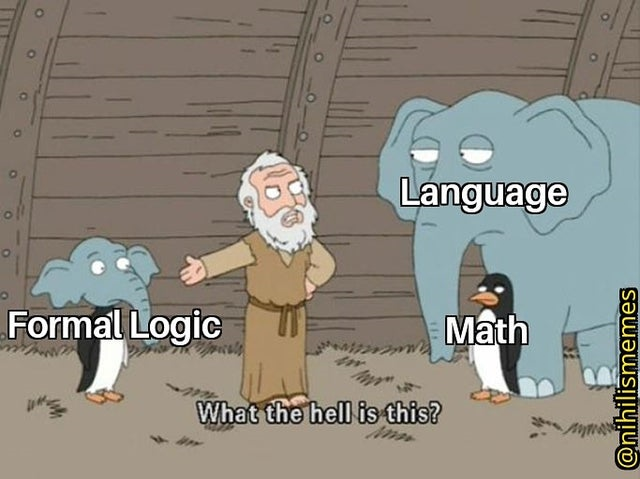One of my favourite stories from human history involves the discovery of the relationship between mathematics and logic in the early 20th century, the one that ends in bitter disappointment and the birth of the computer. While I must admit that a portion of my appreciation for this topic is the direct result of a particular story-teller’s sparkling charisma, the mystery uncovered by Gödel’s Incompleteness Theorems has become a kind of meme-parasite that keeps eating at my cognitive energy. It’s one of those topics that I like to think about when I can’t sleep, and while it is on my to-do list of research projects, unfortunately its rank is pretty low for now. Since I have done little research in this area, the questions and propositions I am about to present are probably wrong or misguided to some degree, but here they are.
Could formal logic, as a representational format with axioms and guided by rules, provide us with a language for articulating laws of metaphysics? From a folk-theoretic perspective, we do this when we talk about whether something is or is not the case, or whether something could be possible given certain conditions. These yes-no questions return a boolean value which may influence further processing or decision-making, like whether or not to bring an umbrella. Our behaviour is governed by events in the real world occurring or failing to obtain, and while our neocortex may like the details of these events, our embodied, animal selves ultimately needs to make a decision about something. Examining simpler organisms, it seems the biological norm tends to involve a limited set of behavioural responses to environmental stimuli, like “fight or flight” for example, which are executed when certain conditions are met. It seems as though the nervous system operates similarly to the way computers use bits, in that if something is or is not the case, then a command can be executed. Notice how these operations are reliant on causation, events generated by physical regularities.Since these binary values serve as a foundation for formal logic more generally, we can identify a connection between tracking physical regularities and modern formal logic.
Being a naturalist, I’m inclined to think the universe works in strange ways and humans have been clever enough to capture some of that strangeness and represent it in accurately through formal systems like math and logic. Although these systems are human creations, they are able to correctly represent the aspects of our physical universe as a result of thousands of years of development. We know this because we have successfully sent humans to the moon and back again; if our formal systems were flawed in any way, such a trip would have made this fact more than apparent.
So what isthe difference between math and logic, aside the fact that there will be unprovable mathematical statements (Raatikainen)? I’m wondering if the devil is in the generativity mathematics provides and the pressure that puts on verification as a result. While logic can handle the processing of quantities, mathematics is like a specialized expansion pack that runs on top of logical systems. With the development of agriculture in early human history, we moved away to relying on the environment to a new type of self-reliance, one which requires physical records for accounting and bookkeeping. While aspects of this new formal system are isomorphic to rules and axioms in logic, mathematics creates a space for explaining physical laws and regularities. Mathematics can track aspects of the environment that logic cannot, like rates of change and probability, and provides us with more information about the details of our physical universe. Physics, as a modern topic of study, provides an epistemic foundation for human societies because it explains both ‘what’ and ‘how’, using the scientific method as a vetting process to inch us toward a decent understanding of reality.
Humans will always notice patterns in systems because that is what our brain has evolved to do, which means the act of verification requires the creation of a separate system because our questions abstract away from the particular to the general. If we want to know whether some local phenomena applies to the system globally, like whether the existence of twin primes continues on indefinitely, we need a separate system, perhaps one built on formal logic, to verify this. These systems contain properties and rules which map to versions in the other, however, their separation is a feature, not a bug, to the chagrin of David Hilbert (Zach). By adding a naturalized epistemological dimension to this discussion on the relationship between math and logic, we can start to see the strengths and weakness of each for human knowledge and understanding. Although logic provides us with a degree of certainty, it necessarily comes at a cost. Mathematics, on the other hand, may allow us to understand our universe in greater detail, however, there will always be patterns or phenomena which will evade certainty or a complete understanding.
What about quantum mechanics? All I will say on the matter is this domain seems to involve probabilities, the space between 0 and 1. Could the strange phenomena seen at this physical level defy some aspect of logic we take for granted in physics? Are we dealing with a new formal system here? If math is like software and logic is like a kernel, what would the electricity in this metaphor be? I have more food for the parasite I guess.

Works Cited
Raatikainen, Panu, “Gödel’s Incompleteness Theorems”, The Stanford Encyclopedia of Philosophy (Spring 2021 Edition), Edward N. Zalta (ed.), URL = <https://plato.stanford.edu/archives/spr2021/entries/goedel-incompleteness/>.
Zach, Richard, “Hilbert’s Program”, The Stanford Encyclopedia of Philosophy (Fall 2019 Edition), Edward N. Zalta (ed.), URL = <https://plato.stanford.edu/archives/fall2019/entries/hilbert-program/>.